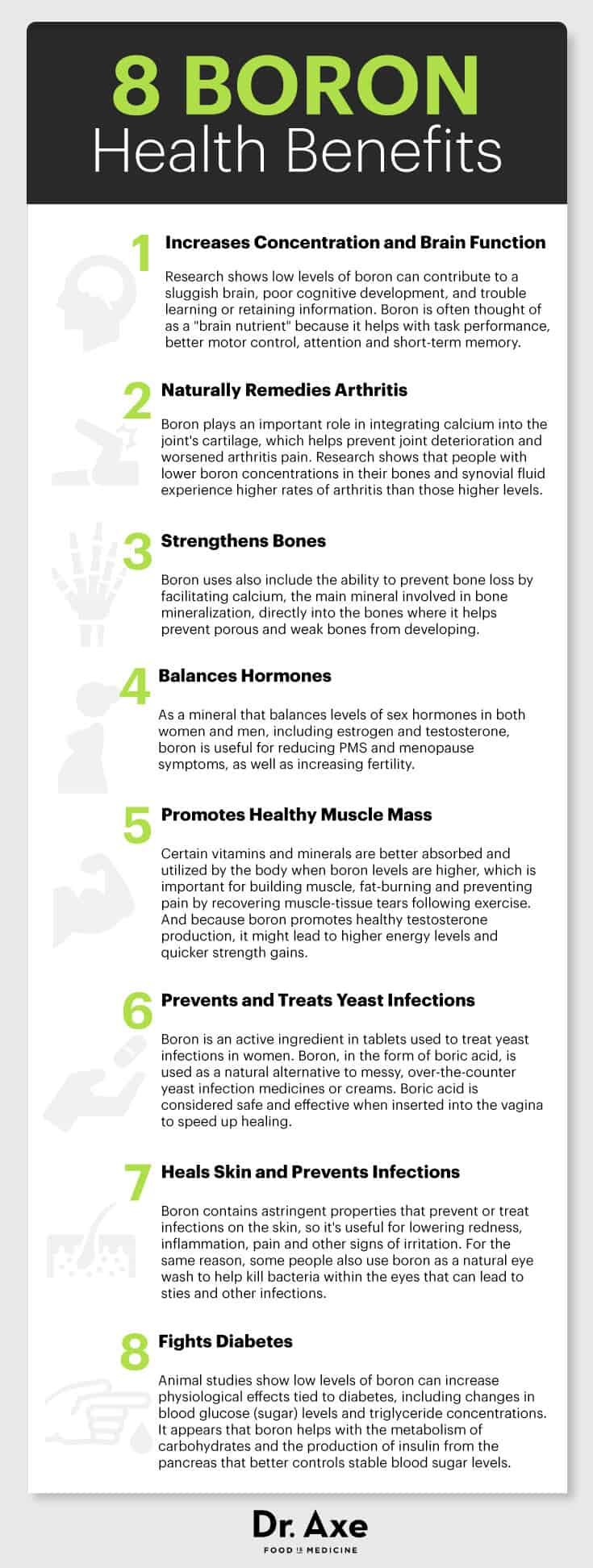Boron &
Boron and your health Boron is an element found naturally in leafy green vegetables like kale and spinach. It can also be found in grains, prunes, raisins, noncitrus fruits, and nuts.
A person’s daily diet typically contains 1.5 to 3 milligrams (mg) of boron. The five sources of boron in a person’s daily diet are:. apples. coffee. dried beans. milk. potatoes Boron helps your body to metabolize key vitamins and minerals, and it also affects estrogen and testosterone levels.
There is no established dietary recommendation for boron in terms of daily value. And a boron deficiency also hasn’t been proven to cause any diseases. Boron and the brain Small studies have indicated that boron may play a role in brain function. Early studies in the 1990s showed promise for human supplementation with boron.
For example, one 1994 study published in the journal found that people who added 3.25 mg of boron to their diets were better at memory and hand-eye coordination tasks than people with low boron levels. These encouraging results didn’t spur a boron research boom. Now boron-related research studies are mostly limited to those performed on laboratory rats. Although researchers know that boron plays a role in many human functions, it’s status as a minor mineral means there aren’t many recent human trials regarding boron’s benefits on the brain. Bones and joints Boron can aid in keeping your bones strong along with possibly improving brain function. Boron is known to play a role in extending the half-life of vitamin D and estrogen. The half-life is the amount of time it takes for a substance to break down to half its starting amount.
Scientists aren’t exactly sure how boron does this. But it could be important for bone health in several ways. First, is essential for bone health because it enhances your body’s ability to absorb calcium. Calcium is a mineral responsible for making bones strong.
Boran Puzzi

Boron Supplement
Boron could help enhance bone health by increasing how long vitamin D works in your body. According to an article in, people with low levels of vitamin D are more likely to have low levels of boron. This shows that the two nutrients have a relationship in terms of their availability in the body. Is another hormone that plays a role in bone health.


It protects against bone loss that can lead to. This is a condition that can make bones weak and brittle in both men and women.
By extending the amount of time estrogen is present in the body, boron may help to maintain healthy bones. While boron supplements have been considered as a possible treatment for people with, more clinical evidence is needed to support this claim. Boron is considered safe for most people, but large amounts can be harmful. There also isn’t data regarding a safe level for children younger than 1 year old. And its safety hasn’t been studied in pregnant women. It’s important that you talk with your doctor before taking supplements. Most experts recommend increasing intake through dietary sources like fruits and vegetables before considering supplements.
If you don’t want to take additional boron supplements, eating foods that contain boron, like prunes, raisins, dried apricots, or avocados, can help increase boron levels.
Calcium provides the building blocks that help keep bones and teeth strong and healthy. It also supports the health of the heart, musculoskeletal system and nervous system. Magnesium helps to regulate calcium transport and stimulates the secretion of calcitonin, a hormone that aids in the influx of calcium into bones.
Magnesium also works with ATP to release the energy needed for most reactions in the body. It plays an important role in protein formation and healthy muscle function. This formulation also contains Boron, a trace mineral that helps facilitate calcium metabolism, which promotes bone health. Adequate Calcium throughout life, as part of a well-balanced diet, may reduce the risk of osteoporosis. Supplement Facts Serving Size: 3 Tablets Amount Per Serving% DV Calcium (as calcium carbonate, calcium gluconate, calcium citrate) 1000 mg 77% Magnesium (as magnesium oxide, magnesium citrate, magnesium gluconate) 400 mg 95% Sodium† 10 mg.